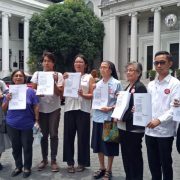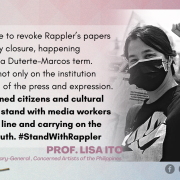‘Bagong Pilipinas’ hymn an old tune, bad song, gimmickry—artists, teachers
Artists and teachers slammed government’s new directive ordering the singing of an additional hymn in weekly flag ceremonies in all government agencies, educational institutions and government-owned and controlled corporations.
The Concerned Artists of the Philippines (CAP) and ACT Teachers’ Party said Malacañang Memorandum Circular No. 52 mandating the singing of the Bagong Pilipinas (New Philippines) hymn and pledge is both an “old tune” and a “gimmick” aimed at whitewashing government’s failures to better the lives of Filipinos.
“Flag ceremonies will be unnecessarily lengthened and made tedious, a waste of people’s money and a waste of people’s time,” CAP said, noting that the National Anthem and the Panatang Makabayan (Nationalist Pledge) are already long enough.
Most government agencies, local government units also usually play their respective hymns in addition to the recitation of the Panunumpa ng Kawani ng Gobyerno (Government Employees’ Pledge) and the speeches delivered by designated speakers in weekly flag ceremonies.
CAP said the new hymn recalls Ferdinand Marcos Sr.’s “Bagong Lipunan” (New Society) motto and hymn in the 1970s “when songs and artistic endeavors were used to whitewash plunder and widespread poverty.”
“Like his father, the son now seeks to cover up the lack of genuine promotion of the Filipino people’s interests using the same methods,” the group, founded in 1983 in opposition to martial law repression under the late dictator and current president Ferdinand Marcos Jr.’s father, added.
ACT Teachers’ Party Representative and House Deputy Minority Leader France Castro said the new hymn is “self-serving and (a) martial law remnant,” and urged Marcos Jr. to stop the gimmickry.
Castro said that the directive is an attempt at indoctrinating government personnel and young Filipinos on the Marcos administration’s “Bagong Pilipinas” slogan and deodorize his father’s “Bagong Lipunan” propaganda repudiated in their family’s ouster in 1986.
“Instead of coming up with these gimmicks, the Marcos administration should be taking this time to think of solutions that would address the citizens’ problems of low workers’ pay and the high cost of goods. They should be helping the drivers and operators who would lose their livelihood and create quality regular jobs in the country,” Castro said.
How bad is the country’s situation?
In a June 4 memorandum, Executive Secretary Lucas Bersamin directed all government offices to integrate the new hymn and pledge in flag ceremonies “to instill the principles of Bagong Pilipinas among government workers.”
The Marcos Jr. government said Bagong Pilipinas slogan embodies its brand of governance and leadership, “characterized by a principled, accountable and dependable government, reinforced by unified institutions of society.”
“It envisions to empower Filipinos to support and participate in all government efforts in an all-inclusive plan towards deep and fundamental social and economic transformation in all sectors of society and government,” the Presidential Communications Office explained in an article.
CAP however said slogans calling for change make Filipinos ask, “So, change is only beginning and that similar pitches in the past have failed?”
“[T]hat for something like this to be effective, kailangan munang magsimula sa pag-amin kung gaano kasadsad ang Pilipinas, kung kailan nasadsad para makita nang malinaw kung bakit ‘panahon na’ para sa tunay na pagbabago.” (…an admission is first needed on how bad the country really is—when did it first go bad?—for everyone to clearly see why “it is time for real change.’)
“Sino ang nagsadsad? Ano ang dapat baguhin? Sino ang magbabago? Paanong babaguhin?” asked. (Who was responsible? What are the things that need change? Who will change? How will change be effected?)
“Kung hindi ito masagot ng pamunuan, sorry. Ang kanta n’yo kasi, lumang tugtugin,” CAP added. (If the administration can’t answer these, sorry. This is because your new song is an old tune.)
The artists group also criticized the new hymn as “[o]bjectionable in form and substance…[t]he lyrics and melody are trite and forgettable.”
CAP added the voices in the recorded version published and distributed by the government “do not meld well.”
“There is no real harmony among the elements of the song itself, a mediocre production that makes one ask how much of taxpayers’ money was spent on it,” CAP said. # (Raymund B. Villanueva)







